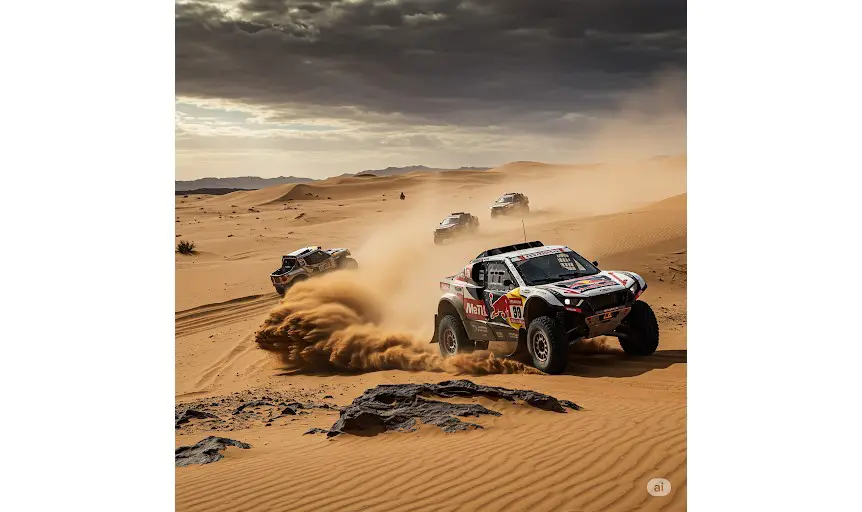
Rally Raid: The Thrilling Sport of Endurance and Adventure
Rally Raid, often referred to as cross-country rallying, is a motorsport that combines speed, navigation, and endurance. It’s a true test of skill for drivers and riders, pushing them to their limits across some of the harshest terrains on Earth. From deserts to dense forests, participants face challenges that require precision and resilience. Rally Raid’s unique blend of adventure and competition has made it a global phenomenon. With a rich history, vibrant community, and professional leagues, it continues to captivate fans worldwide.
The Origin and History of Rally Raid
The origins of Rally Raid trace back to the 1970s. The sport began when adventurers sought to combine off-road driving with endurance racing. In 1977, Thierry Sabine organized the first major event, the Paris-Dakar Rally. This iconic race ran from Paris, France, to Dakar, Senegal. Sabine’s vision was to create a competition that challenged man and machine while celebrating exploration.
The inaugural Paris-Dakar Rally, held in 1979, attracted a mix of professional racers and amateurs. Participants navigated unmarked routes across vast deserts, relying heavily on maps and compasses. Over time, technological advancements transformed the sport. GPS systems replaced traditional navigation tools, enhancing accuracy and safety.
By the 1990s, Rally Raid expanded beyond Africa. New events emerged in South America, Asia, and Europe. The sport’s international appeal grew as organizers adapted races to suit diverse terrains. The Dakar Rally’s relocation to South America in 2009 marked a significant shift. This move ensured the event’s continuity amid safety concerns in Africa.
Rally Raid’s Global Popularity
Rally Raid enjoys immense popularity across continents. Its unique combination of endurance and adventure attracts fans and participants alike. Countries like France, Spain, and Italy have a deep connection to the sport due to their rich motorsport traditions. South America, particularly Argentina and Chile, embraced Rally Raid after hosting the Dakar Rally.
In the Middle East, countries like Saudi Arabia and the United Arab Emirates have become prominent hosts. These regions offer vast deserts ideal for Rally Raid events. Saudi Arabia’s hosting of the Dakar Rally since 2020 has further boosted the sport’s visibility in the region.
Asia has also seen a rise in Rally Raid’s popularity. Events like the Silk Way Rally traverse challenging terrains across Russia, Mongolia, and China. These races showcase the continent’s diverse landscapes while highlighting its growing motorsport community.
Australia and North America are not left behind. The Australasian Safari in Australia and the Sonora Rally in Mexico attract international participants. These events demonstrate the sport’s ability to thrive in diverse environments.
Amateur Rally Raid and Youth Participation
Amateur Rally Raid provides an entry point for enthusiasts to experience the sport. Events cater to individuals and teams with varying levels of experience. Local clubs and organizations often host rallies, ensuring accessibility to a broader audience.
Youth participation is growing as Rally Raid gains recognition among younger demographics. Many schools and academies now offer training programs. These initiatives teach navigation skills, vehicle mechanics, and safety protocols. Simulated races and workshops help aspiring racers develop confidence and competence.
In Europe, programs like the “Junior Rally Raid Academy” focus on nurturing young talent. These academies collaborate with professional teams to provide mentorship and exposure. Similarly, in South America, community-based initiatives introduce Rally Raid to underprivileged youth. These efforts foster inclusivity and promote the sport’s values.
Amateur leagues also play a crucial role in community building. Events like the Baja 1000 and Africa Eco Race welcome amateurs and professionals alike. These races create opportunities for networking and skill development. Enthusiasts often form lifelong connections while participating in these exhilarating competitions.
Professional Leagues in Rally Raid
Rally Raid’s professional leagues showcase the pinnacle of competition. The Dakar Rally remains the most prestigious event, drawing elite racers and manufacturers. It’s known for its grueling stages that test every aspect of racing prowess.
Other significant events include the Abu Dhabi Desert Challenge and the Rallye du Maroc. These races are part of the World Rally-Raid Championship (W2RC), governed by the Fédération Internationale de l’Automobile (FIA) and the Fédération Internationale de Motocyclisme (FIM). The championship features multiple stages held across various countries, crowning champions in different categories.
Manufacturers like KTM, Toyota, and Mini heavily invest in Rally Raid. Their involvement brings technological innovation and elevates competition standards. Professional racers, including legends like Stéphane Peterhansel and Nasser Al-Attiyah, inspire new generations to pursue the sport.
Women’s participation in professional Rally Raid is also noteworthy. Racers like Laia Sanz and Cristina Gutiérrez have achieved remarkable success, breaking stereotypes and inspiring inclusivity. Their achievements highlight the sport’s commitment to diversity and equality.
The Political and Social Significance of Rally Raid
Rally Raid transcends sports, often serving as a platform for political and social causes. Events held in developing regions contribute to local economies through tourism and media exposure. The Dakar Rally’s presence in South America and Saudi Arabia has boosted these regions’ global visibility.
The sport also promotes environmental awareness. Organizers collaborate with conservation groups to minimize ecological impact. Measures include waste management, route planning, and carbon offset programs. These efforts demonstrate a commitment to sustainability while preserving Rally Raid’s adventurous spirit.
On a social level, Rally Raid fosters community and cultural exchange. Participants and fans from diverse backgrounds come together, sharing experiences and traditions. This unity enhances the sport’s appeal, making it a celebration of human resilience and camaraderie.
Rules and Format of Rally Raid
Races are structured to test endurance, navigation, and teamwork. Events typically span several days, with participants covering hundreds of kilometers daily. Stages include timed sections, known as “specials,” and liaison segments connecting checkpoints.
Vehicles are categorized into classes based on type and specifications. Common classes include motorcycles, quads, cars, and trucks. Each category has specific regulations governing engine capacity, weight, and safety features.
Navigation plays a crucial role in Rally Raid. Competitors rely on roadbooks, which provide detailed instructions for the route. GPS devices are permitted but restricted to ensure fair competition. Accuracy in navigation often determines the outcome of races.
Safety is paramount. Participants must adhere to strict guidelines, including wearing protective gear and installing safety equipment in vehicles. Medical teams and recovery units are stationed along routes to respond to emergencies swiftly.
Penalties are imposed for rule violations, such as speeding or missing waypoints. These penalties emphasize the importance of discipline and adherence to regulations. Winning a Rally Raid event requires a combination of speed, strategy, and consistency.
Conclusion
Rally Raid is more than just a motorsport; it’s an adventure that celebrates human endurance and ingenuity. From its humble beginnings in the deserts of Africa to its global prominence, it has inspired countless enthusiasts. The sport’s inclusive nature, professional leagues, and cultural significance continue to drive its growth.
Whether through amateur events or world-class championships, Rally Raid offers something for everyone. Its challenges and triumphs create lasting memories for participants and fans alike. As the sport evolves, it will undoubtedly inspire future generations to embrace the spirit of adventure and competition.





